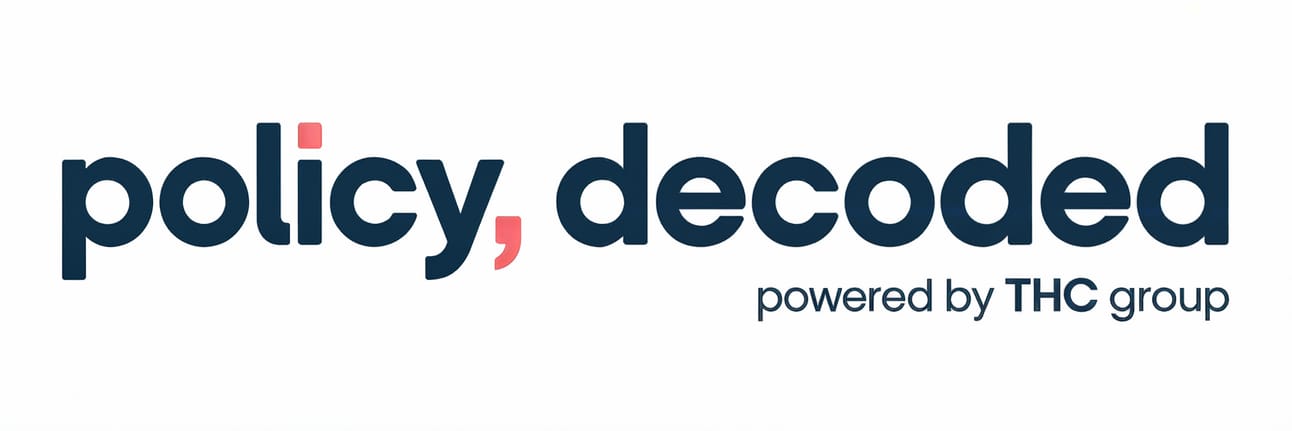Happy Independence Day from Policy, Decoded. We’re taking tomorrow off, so you can enjoy the holiday without a compliance briefing in your inbox.
Before we sign off, here’s what you need to know. New Jersey’s market is suffocating under taxes and zoning rules. Florida’s legalization campaign is barreling toward the 2026 ballot. And lawsuits are stacking up from federal clearance fights to New York’s stalled rollout.
☕ Read it with your morning coffee.
📈 Reference it in your strategy meeting.
📬 Forward it to your compliance lead.
Start smarter. Move faster. Stay ahead.
And please…don’t mix cannabis and fireworks.

Start here — the day’s most important development, decoded for impact.
📌 What Happened:
A flurry of lawsuits over zoning, site control, and licensing delays is grinding New York’s legal cannabis rollout to a halt (Crain’s NY). Operators are trapped between local opposition, sky-high rents, and shifting rules. Some licensees are spending hundreds of thousands of dollars just to secure locations — only to see approvals tied up in litigation. Meanwhile, illicit shops continue to thrive in plain sight.
💡 Why It Matters:
New York promised a market built for equity and small operators. Instead, it built a system where lawsuits and real estate fights determine who survives. For applicants without deep pockets, the delays mean death by a thousand cuts. The combination of restrictive zoning, local opt-outs, and weak enforcement has left the illicit market stronger than ever.
🧠 THC Group Take: Regulators built a system obsessed with control. Zoning fights, site control requirements, and endless litigation have turned landlords and local boards into the real gatekeepers of New York’s cannabis industry. Meanwhile, unlicensed shops spread like weeds, selling openly while legal operators burn cash waiting for approvals.
State officials won’t have the luxury of standing still. Location rules and enforcement priorities will need to shift if the legal market has any chance to claw back ground already lost to the illicit trade.

Fast-moving headlines, flagged for what matters.
The 2026 Florida cannabis legalization initiative has now gathered nearly 70% of the required signatures to qualify for the ballot (Marijuana Moment). Organizers are advancing toward a crucial Supreme Court review phase under Florida law. The campaign’s early momentum puts pressure on opponents while giving operators a chance to prepare for what could become one of the largest cannabis markets in the U.S. if voters approve.
Cannabist’s cultivation workers in New Jersey have ratified their first union contract, securing wage increases, paid leave, and stronger workplace protections (Cannabis Business Times). As unionization gains momentum in cannabis, operators need to factor labor negotiations into their compliance and operational strategies.
A new study reports that THC labeling on cannabis concentrate products tends to be more accurate than flower, likely due to standardized extraction and testing protocols (Ganjapreneur). Flower labeling showed wider variability, raising fresh compliance and consumer trust concerns in an industry where potency drives purchasing decisions. It’s not surprising. Concentrates lend themselves to tighter controls, while flower still sits at the messy intersection of botany, marketing, and lab variability.
A new lawsuit claims the federal government violated contractors’ constitutional rights by asking about marijuana use during security clearance reviews (Marijuana Moment). Plaintiffs argue these questions discriminate against individuals in states where cannabis is legal and chill participation in regulated industries. The case raises broader questions about reconciling federal prohibition with state legalization in employment and national security contexts.
The UK Food Standards Agency (FSA) has released updated guidance on CBD products, prompting many companies to reformulate or pull items from shelves (NutraIngredients). The guidance includes stricter limits on daily CBD consumption and tighter labeling standards. Industry groups warn the move could create confusion for consumers and drive shoppers to unregulated channels. Operators across Europe are watching closely as these changes signal a more conservative regulatory posture for CBD across the UK and possibly the EU.

